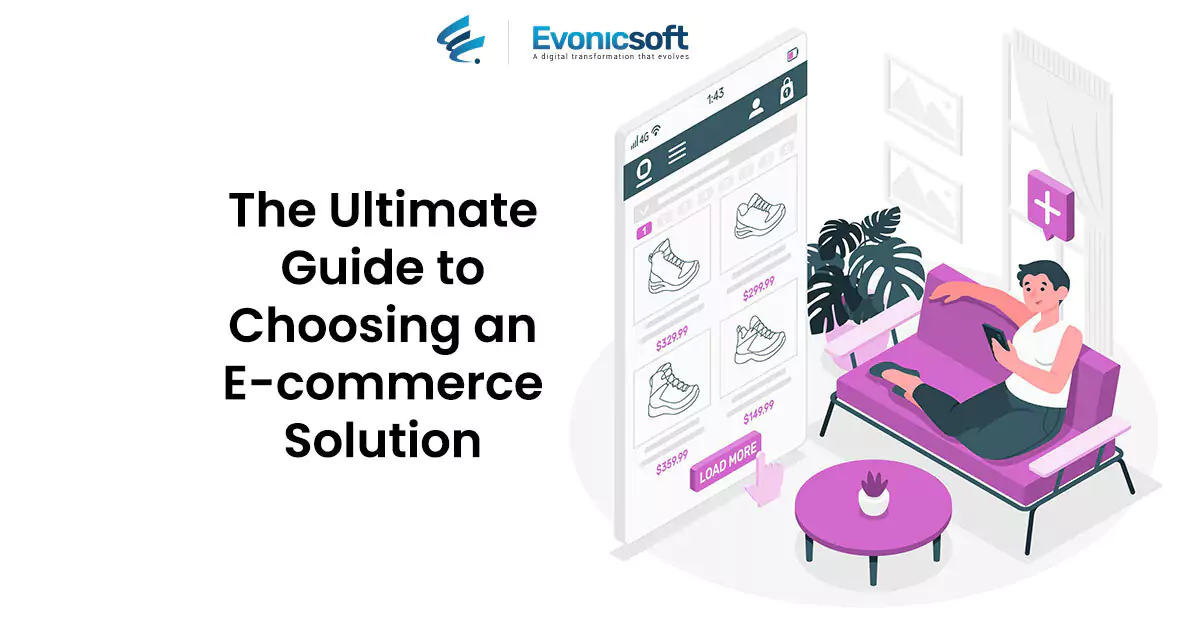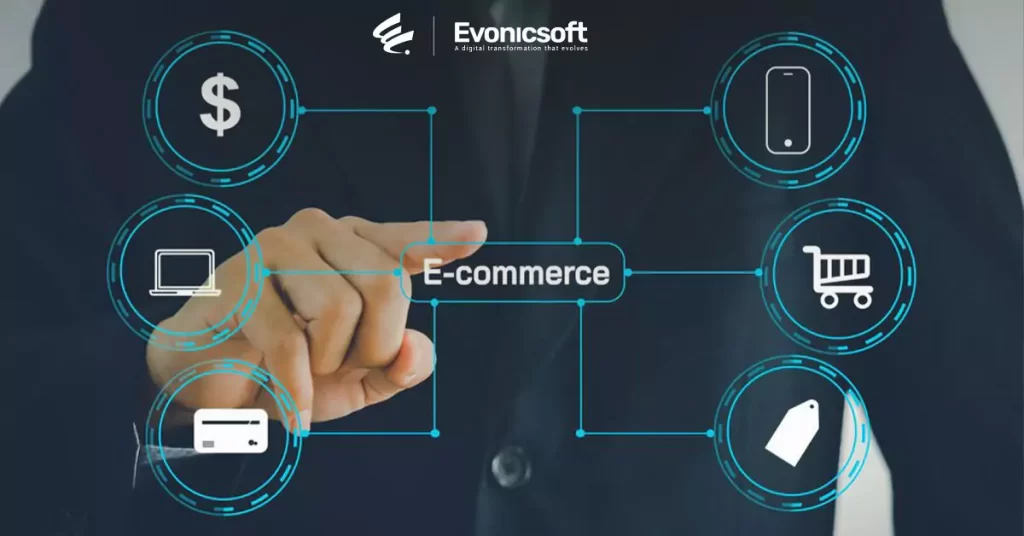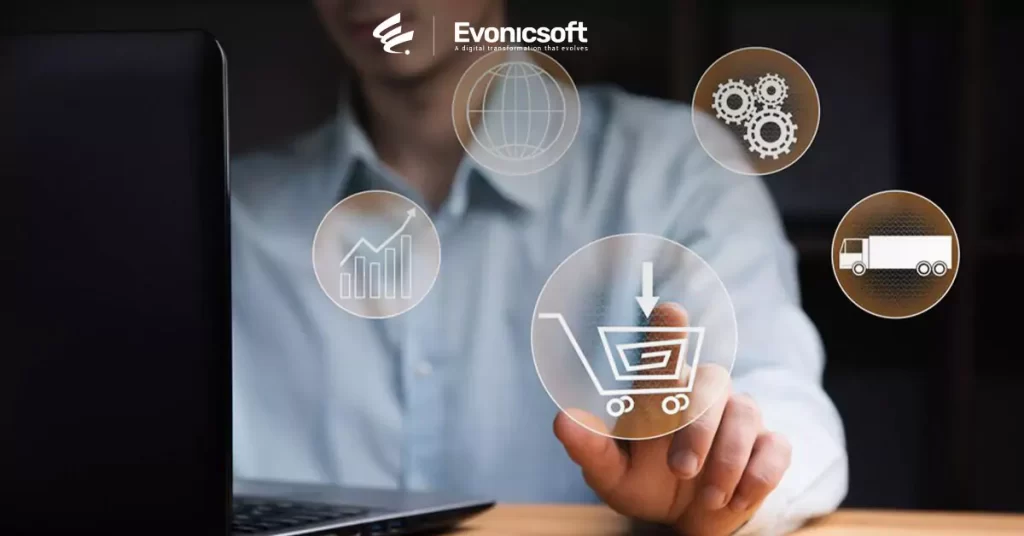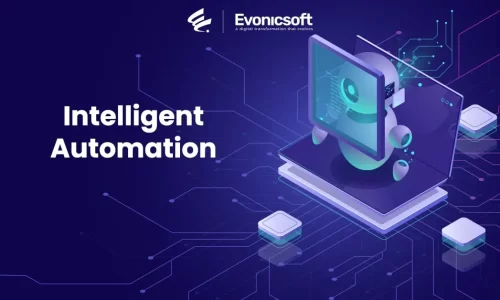
Boosting Sales with Effective E-commerce Solutions
- Sami Ul Hassan
- 17/10/2023
- E-commerce
Introduction to E-commerce Solutions
Why E-commerce solutions? In today’s digital age, having an online presence is crucial for any business. And for businesses looking to sell products or services online, having a reliable and efficient e-commerce solutions is essential.
As online shopping becomes more popular, the need for e-commerce solutions has grown. It is resulting in a competitive market with many available choices.
But with so many choices, how do you know which e-commerce solution is the right fit for your business? We will discuss everything you need to know to make an informed decision when choosing an e-commerce solution.
Moreover, the right e-commerce solution can make or break your online business. It can affect your website’s functionality, user experience, and overall performance. Therefore, it’s crucial to choose a solution that aligns with your business goals and objectives. This guide aims to provide you with the necessary knowledge and insights to help you make the right choice.
Looking for E-commerce solutions services? Contact Evonicsoft.
Understanding E-commerce Solutions

Before we dive into the details of choosing an e-commerce solution. First, let’s gain a comprehensive understanding of what it is and how it operates. An e-commerce solution is a software platform that allows businesses to sell products or services online. It includes features such as a shopping cart, payment processing, inventory management, and order fulfillment.
E-commerce solutions come in various forms, including hosted, self-hosted, and open-source. Each type has its own set of benefits and losses, and it’s essential to understand them before making a decision.
In addition, e-commerce solutions can also provide businesses with tools for marketing, customer relationship management, and analytics. These features can help businesses attract and retain customers, manage their operations more efficiently, and make data-driven decisions. Understanding the different types of e-commerce solutions and their features. It can help you choose the one that best fits your business needs and goals.
Hosted E-commerce Solutions
Hosted e-commerce solutions are platforms where the software and hosting are provided by a third-party company. This means that you don’t have to worry about managing the technical aspects of your online store. For example server maintenance and security.
Popular examples of hosted e-commerce solutions include Shopify, BigCommerce, and Squarespace. These platforms offer a user-friendly interface and a range of features. These help you set up and manage your online store easily.
One of the main advantages of hosted e-commerce solutions is that they are easy to set up and use. It makes them a popular choice for small businesses or those with limited technical knowledge. They also offer a range of templates and easy-to-customize options. These allow you to create a unique and professional-looking online store without the need for coding skills.
However, the downside of hosted solutions is that you have limited control over the software and hosting. You may have to pay additional fees for certain features or transactions.
Furthermore, hosted e-commerce solutions often come with built-in SEO tools, social media integration, and mobile-friendly designs. These features can help you optimize your online store for search engines, and promote your products on social media. As well as provide a seamless shopping experience on mobile devices.
However, keep in mind that while hosted solutions offer convenience and ease of use, they may not be the best choice. If you need a high level of customization or control over your online store.
Self-hosted E-commerce Solutions
Self-hosted e-commerce solutions, also known as on-premise solutions, require you to host the software on your server. This means that you have full control over the software and hosting, giving you more flexibility and customization options. Popular self-hosted e-commerce solutions include Magento, WooCommerce, and OpenCart. These platforms are more suitable for businesses with technical expertise or those looking for more control over their online store.
The main advantage of self-hosted solutions is that you have complete control over the software and hosting. It allows you to customize and scale your online store as needed. You also have the option to integrate with third-party tools and services. That gives you more flexibility in managing your online business.
However, self-hosted solutions require more technical knowledge and resources. You may have to handle server maintenance and security on your own.
In addition, self-hosted e-commerce solutions can provide you with a high level of customization and flexibility. You can choose from a wide range of themes and plugins, and customize the code to fit your specific needs. You may integrate with various third-party tools and services.
However, keep in mind that managing a self-hosted solution requires a certain level of technical expertise. You may need to hire a developer or IT professional to set up and maintain your online store.
Open-source E-commerce Solutions
Open-source e-commerce solutions are platforms where the source code is freely available for anyone to use, modify, and distribute. This means that you have complete control over the software and can customize it to fit your specific needs. Popular open-source e-commerce solutions include PrestaShop, osCommerce, and Zen Cart. These platforms are suitable for businesses with technical expertise or those looking for an easy-to-customize and cost-effective solution.
The main advantage of open-source solutions is that they are easy to customize and cost-effective. Since there are no costs for the software or hosting. You also have a community of developers constantly working on improving the software and adding new features.
However, open-source solutions require technical expertise to set up and manage. You may have to pay for additional features or support.
Moreover, open-source e-commerce solutions can provide you with a high level of flexibility and control. You can modify the source code to fit your specific needs and add or remove features as needed. You can also choose your hosting provider.
However, keep in mind that managing an open-source solution requires a high level of technical expertise. You may need to hire a developer or IT professional to set up, customize, and maintain your online store.
Factors to Consider When Choosing an E-commerce Solution

Now that you have a better understanding of the different types of e-commerce solutions. Let’s look at the key factors you should consider when choosing one for your business.
Type of Products or Services
The kinds of things you sell make a big difference in finding the right e-commerce solution for your business. For example, if you sell physical products, you will need a solution that offers inventory management and shipping options.
On the other hand, if you offer digital products or services. You may need a solution that supports digital downloads and subscriptions. Make a list of the features you need for your specific products or services. Use it as a guide when evaluating different e-commerce solutions.
In addition, consider the complexity of your products or services. If you sell products with multiple variations or options, you may need a solution that supports complex product configurations. If you offer personalized or custom-made products, you may need a solution that allows customers to customize their orders. Understanding your product or service requirements can help you choose an e-commerce solution that can handle your specific needs.
Budget
Another crucial factor to consider is your budget. E-commerce solutions come with different pricing plans, and it’s essential to choose one that fits your budget. Hosted solutions typically have a monthly subscription fee.
While self-hosted and open-source solutions may require a one-time payment or ongoing maintenance costs. Consider the features and support included in each plan and choose one that offers the best value for your money.
Furthermore, it’s important to consider that the cost of an e-commerce solution extends beyond the mere software or hosting fees. You may also need to consider the cost of setting up and maintaining your online store. Including the cost of a domain name, SSL certificate, payment gateway, and other necessary tools and services. Make sure to factor in all these costs when determining your budget.
Grooming
As your business grows, your e-commerce solution should be able to grow with it. Selecting a solution that can meet your current requirements and adapt as your business grows is crucial. Hosted solutions may have limitations on the number of products or transactions.
While self-hosted and open-source solutions can be customized and scaled as needed. Consider your long-term goals and choose a solution that can support your business’s growth.
In addition, consider the performance and reliability of the e-commerce solution. As your business grows, you may experience an increase in traffic and transactions. Your e-commerce solution should be able to handle this increase without affecting the performance or uptime of your online store. Make sure to choose a solution that offers high performance and reliability, even during peak times or high traffic volumes.
User-Friendliness
The ease of use of an e-commerce solution is crucial, especially if you don’t have technical expertise. Hosted solutions are generally more user-friendly, with a simple interface and drag-and-drop design options.
Self-hosted and open-source solutions may require some technical knowledge to set up and manage. But they offer more customization options. Consider your level of technical expertise and choose a solution that you can easily navigate and manage.
Furthermore, consider the learning curve of the e-commerce solution. Some solutions may require a steep learning curve, especially if you’re not familiar with e-commerce or web development. Choose a solution that offers a user-friendly interface, clear instructions, and comprehensive documentation. This can help you get up and running quickly and manage your online store more efficiently.
Integration Options
Integrations with third-party tools and services can enhance the functionality of your e-commerce solution. For example, you may want to integrate with a payment gateway, email marketing platform, or accounting software.
Hosted solutions typically have a range of integrations available, while self-hosted and open-source solutions may require custom development. Here’s a more human-friendly version of your request:
“First, make a list of all the connections and tools you require for your project. Then, pick a solution that either comes with these connections built-in or allows you to create your custom connections.”
In addition, consider the flexibility of the e-commerce solution in terms of integrations. Some solutions may have limitations on the types of integrations they support or the number of integrations you can add. Choose a solution that offers a high level of flexibility and adaptable with various third-party tools and services. This can help you extend the functionality of your online store and streamline your business operations.
Customer Support
Having reliable customer support is crucial when running an online business. If you encounter any issues with your e-commerce solution, you want to be able to get help quickly. Hosted solutions typically offer 24/7 customer support, while self-hosted and open-source solutions may have limited support options. Consider the level of support you need and choose a solution that offers the appropriate support channels.
Moreover, consider the quality of the customer support. Do they provide prompt and useful responses? Do they have a knowledge base or community forum where you can find answers to common questions? Is support available through multiple communication channels, including email, phone, and live chat?
High-quality customer support can make a big difference in your experience with the e-commerce solution.
Conclusion
Choosing the right e-commerce solution for your business is a crucial decision that can impact your online success. It’s essential to understand the different types of solutions available and consider factors. Such as your budget, growing, and integration options when making a decision.
Whether you choose a hosted, self-hosted, or open-source solution. The key is to find one that meets your specific needs and can support your business’s growth. With this guide, we hope you can make an informed decision and find the perfect e-commerce solution for your business.
In conclusion, the right e-commerce solution can help you create a successful online store. That meets your business needs and goals. It can provide you with the tools and features you need to sell your products or services online. It manages your operations efficiently, and provides a seamless shopping experience for your customers.
By understanding the different types of e-commerce solutions and considering the key factors. You can choose the solution that best fits your business and sets you up for online success.
Evonicsoft provides one of the best E-commerce solutions.
References
- https://www.shopify.com/
- https://www.bigcommerce.com/
- https://www.squarespace.com/
- https://magento.com/
- https://woocommerce.com/
- https://www.opencart.com/
- https://www.prestashop.com/
- https://www.oscommerce.com/
- https://www.zen-cart.com/

by freestocks (https://unsplash.com/@freestocks)






